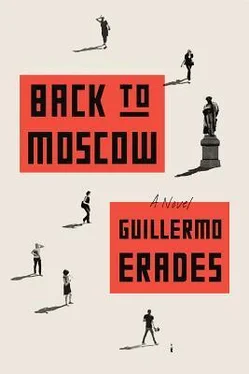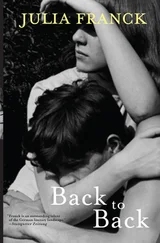‘I see,’ I say. ‘Like War and Peace .’
‘I guess,’ Stepanov says. ‘Haven’t read it.’
‘You never read War and Peace ?’
Stepanov shakes his head, looking down at the coffee table. ‘I started it a couple of times. Too fucking long.’
‘Russians can’t live without existential fear,’ Colin says. ‘They are a screwed-up nation.’
‘I wouldn’t put it exactly like that,’ Stepanov says.
‘They have an enormous inferiority complex,’ Colin continues, now pointing at Stepanov. ‘With all their shit about being a special nation and all that, if you scratch under the surface, all Russians are jealous of the West. Of America in particular.’
‘Have you read War and Peace ?’ I ask Colin.
‘I saw the movie,’ he says. ‘What I mean is, making enemies is how Russia tries to overcome its inferiority complex. The hostile attitude, the political whining, it’s just a façade, it makes Russians feel more valued, or, at least, less ignored. That’s why they came up with the whole communist fiasco and put up with it for so long. They knew it didn’t work, but they liked the feeling of being feared.’
‘I thought communism was about giving life some meaning,’ I say. ‘Through sacrifice and suffering.’
‘Bullshit,’ Colin says. ‘It was about prestige. Like the unpopular kid in school that turns into a bully. He’s never going to be one of the popular guys, so he’d rather be a bully than a nerd. That’s Russia.’
‘Communism was awesome,’ Diego says. ‘It would have been great to live here twenty years ago, when people believed in those things. Social justice, ideals. The fall of the Soviet Union was a historical tragedy for the entire world. No wonder Russia is such a mess now. And the people are so confused.’
‘That’s what makes Moscow so fucking interesting,’ Colin says. ‘The confusion, the chaos. We’re just lucky to be here at this moment in history. In a few years it’ll all be sanitised and clean like the West. I would die of boredom now if I had to live in the States.’
Stepanov stands up, walks towards the turntable. ‘Russia will never be like the West.’
‘Let’s hope not,’ Colin says.
Stepanov takes the KINO record from the turntable and slides it into its black sleeve. ‘We see the world in a different way.’
‘Vodka’s finished,’ I say. ‘Should we start moving?’
‘How are we getting there?’ Diego says. ‘We don’t even know the address. I don’t want to walk around in this rain.’
‘It’s somewhere behind Lubyanka,’ Stepanov says. ‘We’ll ask the taxi to drive around until we find it. It’s opening night, there’ll be people outside.’
We stand up. Diego helps Stepanov take the empty bottles and glasses to the kitchen. We start putting our shoes on.
Diego readjusts his shapka in front of a wall mirror. ‘I’m looking forward to seeing this place,’ he says.
‘It’s gonna be awesome,’ Colin says.
Stepanov takes his sunglasses from the coffee table, switches the lights off. We leave the apartment and head down to the street.
IN THE EVENINGS THE rain fell frozen, heavy, and for two weeks all the streets around Pushkinskaya were covered in mud and slush. The floors of perekhods and metro platforms were smeared in black sludge, wet and slippery — the underground air swamped by the smell of damp earth. Then, one day in late November, temperatures dropped below freezing, the wind and the rain stopped, and dry snow started to fall over Moscow.
The snow began around noon and went on until late in the evening — falling in silence and piling on the stack of plastic chairs on Scandinavia’s terrace, on parked cars, on the bare trees of the Boulevard, on Pushkin’s bronze shoulders.
Lena stood by the balcony door, staring at the snowfall.
‘I love Moscow in winter,’ I said. From the couch I could not see her face but I knew she was crying.
‘The snow will cover all the shit until spring,’ she replied. She was in her underwear, red lace knickers and matching bra, holding a cup of tea that had long gone cold.
‘Come here, Lenushka.’
‘I’m going home.’
‘Stay, please.’
She turned to me. ‘What for?’
‘It’s late. And cold outside. Come back to the couch. We can talk about everything tomorrow.’
The flat was dark, but for a solitary candle flickering on the coffee table, next to an empty wine bottle.
‘Martin, you said you might write a book about your life in Moscow.’
‘Maybe after my PhD, something more personal.’
‘If you write about me,’ Lena said, ‘please make it a sad story.’
‘All Russian stories are sad.’
‘True.’ Lena took a sip of cold tea and continued crying in silence. I knew she would not let it go. Once Lena had found a reason to cry she did not stop.
‘I don’t think I want to see you tomorrow,’ she said. ‘I don’t think I want to see you again.’
I sat up on the couch, draped a blanket over my shoulders. ‘What’s wrong?’
‘You really don’t care about me, about how I feel inside. You have no capacity for compassion.’
Compassion. Sostradaniye. Co-suffering. Lena didn’t like it that I wasn’t able to suffer with her.
She placed the cup of tea on the table, picked her crumpled jeans up from the carpet, shook out the legs.
‘Lenushka, please.’
‘Can I ask you something?’
‘Please.’
She was holding the little cross of her necklace. ‘Do you love me?’
I grabbed my glass of wine from the table, had a sip. ‘In what sense?’
‘Why is it so hard for you to say I love you?’
‘Everybody says I love you. It means nothing.’
‘Maybe it means nothing where you come from. Here it means a lot. I love you, Martin. I’m not afraid of saying it. I’m connected to my emotions. I say what I feel. But you never said you loved me. Not even once.’
‘What’s your point?’
‘I want to know that you have feelings for me,’ Lena said, ‘that I’m important to you. Not just someone you sleep with.’
I didn’t know what to say. I tried to come up with some smart words, something revealing the depth and complexity of my feelings for Lena without falling into the tackiness of a forced love confession. Something witty, honest, simple — worthy of a Chekhov character. But the words didn’t quite form in my mouth.
Lena slipped into her jeans, wiped her tears with the tips of her fingers.
I stood up, grasped her hand.
‘Lena, I really like spending time with you. You know that. I love it when we are together. Let’s go to sleep, please.’
I tried to kiss her but she turned her face away. I wrapped my arms around her waist and pulled her gently towards me — her breasts now pressed against my body.
We embraced and on my cheeks I felt the damp warmth of her tears. I kissed her neck. Lena didn’t budge. We stood skin to skin, in the darkness. Not knowing what to do, I retreated to the bathroom for a quick shower.
When I came out, Lena was standing by the double front door, zipping up her high-heeled boots. She was wearing a white woollen hat and a matching scarf. In high heels Lena was a bit taller than me.
‘The metro must already be closed,’ I said. ‘Do you need money for a taxi?’
‘Martin, I’m not a whore.’
Lena stood motionless, waiting for me to open the doors. Tears had smudged her mascara — she had black smeared all over her face. I tried to wipe her cheeks but she pushed my hand away. I unlocked the doors and she walked out.
Lena didn’t take the lift. Instead, she stomped down the stairs, her boots tapping loudly all six floors down to the street. I closed the doors, wrapped myself in the blanket again and stepped onto the balcony. The air outside was icy and crisp — Moscow was covered in fresh snow. I saw Lena coming out of the entrance below, looking small and remote. She opened the metal courtyard gate, turned left, and disappeared under the archway beneath my building.
Читать дальше












